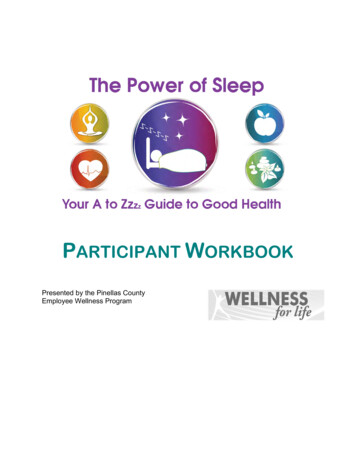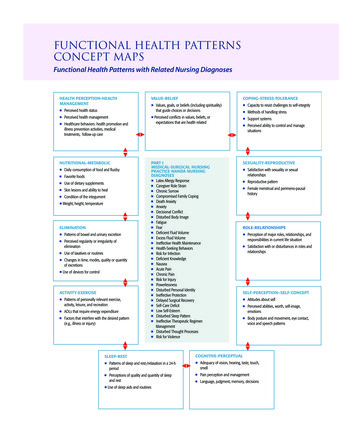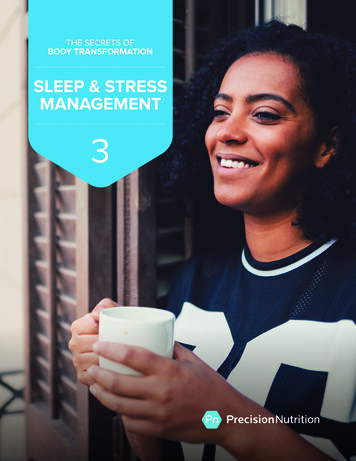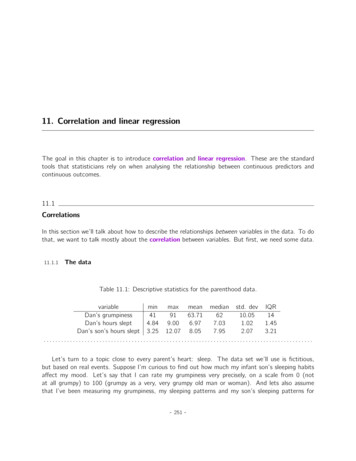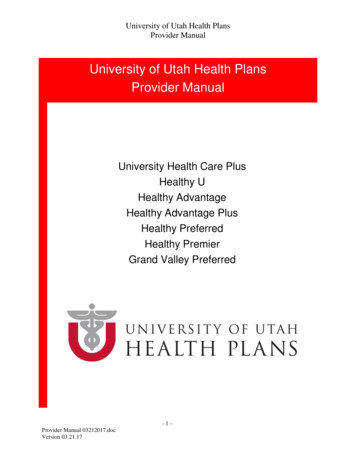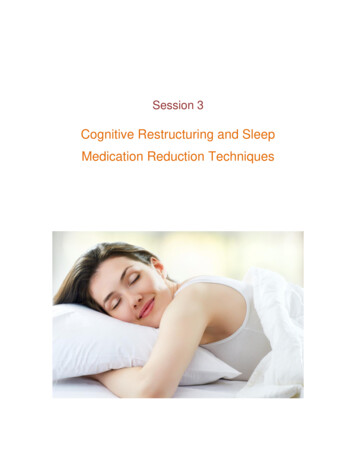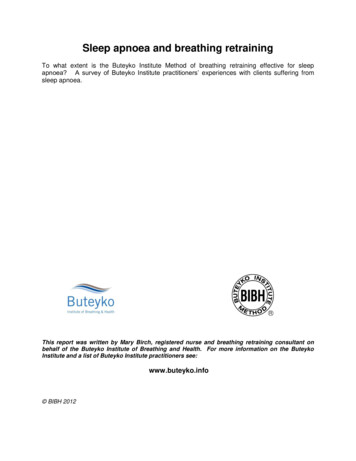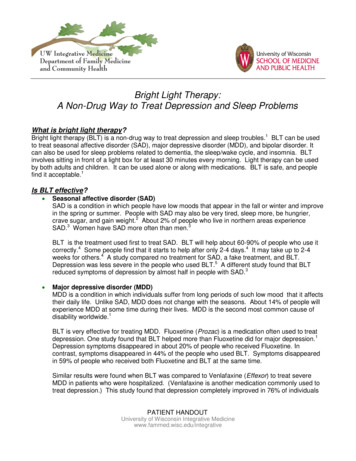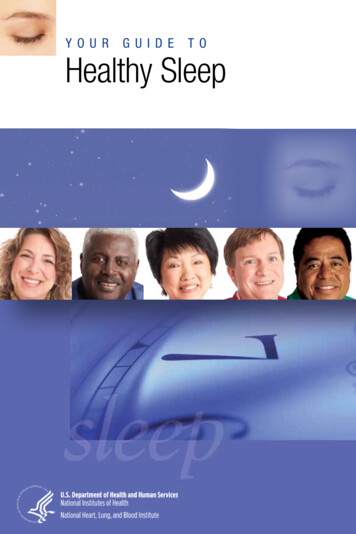
Transcription
Y O U RGU I DET OHealthy Sleep
Y o u rG u i d et oHealthy SleepNIH Publication No. 11-5271Originally printed November 2005Revised August 2011
ContentsIntroduction . . . . . . . . . . . . . . . . . . . . . . . . . . . . . . . . . . . . . . . . . . . . . . . .1What Is Sleep? . . . . . . . . . . . . . . . . . . . . . . . . . . . . . . . . . . . . . . . . . . . . . . . 4What Makes You Sleep? . . . . . . . . . . . . . . . . . . . . . . . . . . . . . . . . . . . . 7What Does Sleep Do for You? . . . . . . . . . . . . . . . . . . . . . . . . . . . . . . . . . . 12Your Learning, Memory, and Mood . . . . . . . . . . . . . . . . . . . . . . . . 12Your Heart . . . . . . . . . . . . . . . . . . . . . . . . . . . . . . . . . . . . . . . . . . 13Your Hormones . . . . . . . . . . . . . . . . . . . . . . . . . . . . . . . . . . . . . . 14How Much Sleep Is Enough? . . . . . . . . . . . . . . . . . . . . . . . . . . . . . . . . . . . 19What Disrupts Sleep? . . . . . . . . . . . . . . . . . . . . . . . . . . . . . . . . . . . . . 25Is Snoring a Problem? . . . . . . . . . . . . . . . . . . . . . . . . . . . . . . . . . . . . 30Common Sleep Disorders . . . . . . . . . . . . . . . . . . . . . . . . . . . . . . . . . . . . . .Insomnia . . . . . . . . . . . . . . . . . . . . . . . . . . . . . . . . . . . . . . . . . .Sleep Apnea . . . . . . . . . . . . . . . . . . . . . . . . . . . . . . . . . . . . . . .Restless Legs Syndrome . . . . . . . . . . . . . . . . . . . . . . . . . . . . . .Narcolepsy . . . . . . . . . . . . . . . . . . . . . . . . . . . . . . . . . . . . . . . .Parasomnias (Abnormal Arousals) . . . . . . . . . . . . . . . . . . . . . . .333538474851Do You Think You Have a Sleep Disorder? . . . . . . . . . . . . . . . . . . . . . . . . . 53How To Find a Sleep Center and Sleep Specialist . . . . . . . . . . . . . . . . . . 56Research . . . . . . . . . . . . . . . . . . . . . . . . . . . . . . . . . . . . . . . . . . . . . . 57For More Sleep Information . . . . . . . . . . . . . . . . . . . . . . . . . . . . . . . 60Contents
1IntroductionThink of your daily activities. Which activity is so important youshould devote one-third of your time to doing it? Probably the firstthings that come to mind are working, spending time with yourfamily, or doing leisure activities. But there’s something else youshould be doing about one-third of your time—sleeping.Many people view sleep as merely a “down time” when their brainsshut off and their bodies rest. People may cut back on sleep, think ing it won’t be a problem, because other responsibilities seem muchmore important. But research shows that a number of vital taskscarried out during sleep help people stay healthy and function attheir best.While you sleep, your brain is hard at work forming the pathwaysnecessary for learning and creating memories and new insights.Without enough sleep, you can’t focus and pay attention or respondquickly. A lack of sleep may even causemood problems. Also, growingevidence shows that a chroniclack of sleep increases your riskof obesity, diabetes, cardiovas cular disease, and infections.Introduction
2Despite growing support for the idea that adequate sleep, likeadequate nutrition and physical activity, is vital to our well-being,people are sleeping less. The nonstop “24/7” nature of the worldtoday encourages longer or nighttime work hours and offerscontinual access to entertainment and other activities. To keep up,people cut back on sleep.A common myth is that people can learn to get by on little sleep(such as less than 6 hours a night) with no adverse effects. Researchsuggests, however, that adults need at least 7–8 hours of sleep eachnight to be well rested. Indeed, in 1910, most people slept 9 hours anight. But recent surveys show the average adult now sleeps fewerthan 7 hours a night. More than one-third of adults report daytimesleepiness so severe that it interferes with work, driving, and socialfunctioning at least a few days each month.Evidence also shows that children’s and adolescents’ sleep is shorterthan recommended. These trends have been linked to increasedexposure to electronic media. Lack of sleep may have a direct effecton children’s health, behavior, and development.Your Guide to Healthy SleepChronic sleep loss or sleep disorders mayaffect as many as 70 million Americans.This may result in an annual cost of 16 billion in health careexpenses and 50 billion inlost productivity.
3What happens when you don’t get enough sleep? Can you make upfor lost sleep during the week by sleeping more on the weekends?How does sleep change as you become older? Is snoring a problem?How can you tell if you have a sleep disorder? Read on to find theanswers to these questions and to better understand what sleep isand why it is so necessary. Learn about common sleep myths andpractical tips for getting enough sleep, coping with jet lag andnighttime shift work, and avoiding dangerous drowsy driving.Many common sleep disorders go unrecognized and thus are nottreated. This booklet also gives the latest information on sleepdisorders such as insomnia (trouble falling orstaying asleep), sleep apnea (pauses inbreathing during sleep), restless legssyndrome, narcolepsy (extreme daytimesleepiness), and parasomnias (abnormalsleep behaviors).SZE-PING“It’s important to tell yourdoctor what you areexperiencing, so you canhelp your doctor diagnoseyour condition.”Introduction
4What Is Sleep?Sleep was long considered just a block of time when your brain andbody shut down. Thanks to sleep research studies done over thepast several decades, it is now known that sleep has distinct stagesthat cycle throughout the night in predictable patterns. How wellrested you are and how well you function dependnot just on your total sleep time but on how muchsleep you get each night and the timing of yoursleep stages.Your Guide to Healthy SleepYour brain and body functions stay active through out sleep, and each stage of sleep is linked to aspecific type of brain waves (distinctivepatterns of electrical activity in the brain).Sleep is divided into two basic types:rapid eye movement (REM) sleep andnon-REM sleep (with three differentstages). (For more information, see“Types of Sleep” on page 5.) Typically,sleep begins with non-REM sleep. Instage 1 non-REM sleep, you sleep lightlyand can be awakened easily by noises orother disturbances. During this first stageof sleep, your eyes move slowly, yourmuscles relax, and your heart and breath ing rates begin to slow. You then enterstage 2 non-REM sleep, which is definedby slower brain waves with occasionalbursts of rapid waves. You spend abouthalf the night in this stage.When you progress into stage 3 nonREM sleep, your brain waves becomeeven slower, and the brain producesextremely slow waves almost exclusively(called Delta waves).
5Stage 3 is a very deep stage of sleep, during which it is very difficultto be awakened. Children who wet the bed or sleep walk tend to doso during stage 3 of non-REM sleep. Deep sleep is considered the“restorative” stage of sleep that is necessary for feeling well restedand energetic during the day.Types ofSleepNon-REM SleepREM SleepStage 1: Light sleep; easilyawakened; musclesrelax with occasionaltwitches; eyemovements are slow.lStage 2: Eye movements stop;slower brain waves,with occasional burstsof rapid brain waves.lStage 3: Occurs soon after youfall asleep and mostlyin the first half of thenight. Deep sleep;difficult to awaken;large slow brainwaves, heart andrespiratory rates areslow and muscles arerelaxed.lllUsually first occursabout 90 minutesafter you fall asleep,and longer, deeperperiods occur duringthe second half of thenight; cycles along withthe non-REM stagesthroughout the night.Eyes move rapidlybehind closed eyelids.Breathing, heart rate,and blood pressure areirregular.Dreaming occurs.Arm and leg musclesare temporarilyparalyzed.Types of SleepWhat Is Sleep?During REM sleep, your eyes move rapidly in different directions, eventhough your eyelids stay closed. Your breathing also becomes morerapid, irregular, and shallow, and your heart rate and blood pressureincrease. Dreaming typically occurs during REM sleep. During thistype of sleep, your arm and leg muscles are temporarily paralyzed sothat you cannot “act out” any dreams that you may be having.
6You typically first enter REM sleep about an hour to an hour and ahalf after falling asleep. After that, the sleep stages repeat them selves continuously while you sleep. As you sleep, REM sleep timebecomes longer, while time spent in stage 3 non-REM sleep becomesshorter. By the time you wake up, nearly all your sleep time hasbeen spent in stages 1 and 2 of non-REM sleep and in REM sleep.If REM sleep is severely disrupted during one night, REM sleep timeis typically longer than normal in subsequent nights until you catchup. Overall, almost one-half of your total sleep time is spent instage 2 non-REM sleep and about one-fifth each in deep sleep (stage 3of non-REM sleep) and REM sleep. In contrast, infants spend halfor more of their total sleep time in REM sleep. Gradually, as theygrow, the percentage of total sleep time they spend in REM contin ues to decrease, until it reaches the one-fifth level typical of laterchildhood and adulthood.Your Guide to Healthy SleepWhy people dream and why REM sleep is so important are not wellunderstood. It is known that REM sleep stimulates the brainregions you use to learn and make memories. Animal studiessuggest that dreams may reflect the brain’s sorting and selectivelystoring new information acquired during wake time. While thisinformation is processed, the brain might revisit scenes from the dayand mix them randomly. Dreams are generally recalled when wewake briefly or are awakened by an alarm clock or some other noisein the environment. Studies show, however, that other stages ofsleep besides REM also are needed to form the pathways in thebrain that enable us tolearn and remember.
7What Makes You Sleep?Although you may put off going to sleep in order to squeeze moreactivities into your day, eventually your need for sleep becomesoverwhelming. This need appears to be due, in part, to two sub stances your body produces. One substance, called adenosine,builds up in your blood while you’re awake. Then, while you sleep,your body breaks down the adenosine. Levels of this substance inyour body may help trigger sleep when needed.A buildup of adenosine and many other complex factors mightexplain why, after several nights of less than optimal amounts ofsleep, you build up a sleep debt. This may cause you to sleep longerthan normal or at unplanned times during the day. Because of yourbody’s internal processes, you can’t adapt to getting less sleep thanyour body needs. Eventually, a lack of sleep catches up with you.The other substance that helps make you sleep is a hormone calledmelatonin. This hormone makes you naturally feel sleepy at night.It is part of your internal “biological clock,” which controls whenyou feel sleepy and your sleep patterns. Your biological clock is asmall bundle of cells in your brain that works throughout the dayand night. Internal and external environmental cues, such as lightsignals received through your eyes, control these cells. Your biologi cal clock triggers your body to produce melatonin, which helpsprepare your brain and body for sleep. As melatonin is released,you’ll feel increasingly drowsy. Because of your biological clock,you naturally feel the most tired between midnight and 7 a.m. Youalso may feel mildly sleepy in the afternoon between 1 p.m. and4 p.m. when another increase in melatonin occurs in your body.What Makes You Sleep?Your biological clock makes you the most alert during daylighthours and the least alert during the early morning hours. Conse quently, most people do their best work during the day. Our 24/7society, however, demands that some people work at night. Nearlyone-quarter of all workers work shifts that are not during thedaytime, and more than two-thirds of these workers have problemsleepiness and/or difficulty sleeping. Because their work schedules
8are at odds with powerful sleep-regulating cues like sunlight, nightshift workers often find themselves drowsy at work, and they havedifficulty falling or staying asleep during the daylight hours whentheir work schedules require them to sleep.The fatigue experienced by night shift workers can be dangerous.Major industrial accidents—such as the Three Mile Island andChernobyl nuclear power plant accidents and the Exxon Valdez oilspill—have been caused, in part, by mistakes made by overly tiredworkers on the night shift or an extended shift.Night shift workers also are at greater risk of being in car crasheswhen they drive home from work during the early morning hours,because the biological clock is not sending out an alerting signal.One study found that one-fifth of night shift workers had a car crashor a near miss in the preceding year because of sleepiness on thedrive home from work. Night shift workers are also more likely tohave physical problems, such as heart disease, digestive troubles, andinfertility, as well as emotional problems. All of these problems maybe related, at least in part, to the workers’ chronic sleepiness, possi bly because their biological clocks are not in tune with their workschedules. See “Working the Night Shift” on page 9 for somehelpful tips if you work a night shift.Your Guide to Healthy SleepOther factors also can influence your need for sleep, including yourimmune system’s production of hormones called cytokines. Cyto kines are made to help the immune system fight certain infections orchronic inflammation and may prompt you to sleep more thanusual. The extra sleep may help you conserve the resources neededto fight the infection. Recentstudies confirm that being wellrested improves the body’sresponses to infection.People are creatures ofhabit, and one of thehardest habits to break isthe natural wake andsleep cycle. Together, anumber of physiologicalfactors help you sleepand wake up at thesame times each day.
9Consequently, you may have a hard time adjusting when you travelacross time zones. The light cues outside and the clocks in your newlocation may tell you it is 8 a.m. and you should be active, but yourbody is telling you it is more like 4 a.m. and you should sleep. Theend result is jet lag—sleepiness during the day, difficulty falling orstaying asleep at night, poor concentration, confusion, nausea, andgenerally feeling unwell and irritable. See “Dealing With Jet Lag” onpage 10.Working theNight ShiftTry to limit night shift work, if that is possible. If you must workthe night shift, the following tips may help you:lllllIncrease your total amount of sleep by adding naps andlengthening the amount of time you allot for sleep.Use bright lights in your workplace.Minimize the number of shift changes so that your body’sbiological clock has a longer time to adjust to a nighttimework schedule.Get rid of sound and light distractions in your bedroomduring your daytime sleep.Use caffeine only during the first part of your shift topromote alertness at night.If you are unable to fall asleep during the day, and all else fails,talk with your doctor to see whether it would be wise for youto use prescribed, short-acting sleeping pills to help you sleepduring the day.What Makes You Sleep?Night Shift
10Dealing WithJet LagBe aware that adjusting to a new time zone may take severaldays. If you are going to be away for just a few days, it may bebetter to stick to your original sleep and wake times as much aspossible, rather than adjusting your biological clock too manytimes in rapid succession.Eastward travel generally causes more severe jet lag thanwestward travel because traveling east requires you to shortenthe day, and your biological clock is better able to adjust to alonger day than a shorter day. Fortunately for globetrotters, afew preventive measures and adjustments seem to help somepeople relieve jet lag, particularly when they are going to spendmore than a few days at their destination:lYour Guide to Healthy SleeplAdjust your biological clock. During the 2–3 days prior to along trip, get adequate sleep. You can make minor changesto your sleep schedule. For example, if you are travelingwest, delay your bed time and wake time progressively by20- to 30-minute intervals. If you are traveling east, advanceyour wake time by 10 to 15 minutes a day for a few days andtry to advance your bed time. Decreasing light exposureat bedtime and increasing light exposure at wake time canhelp you make these adjustments. When you arrive at yourdestination, spend a lot of time outdoors so your body getsthe light cues it needs to adjust to the new time zone. Takea couple of short 10–15 minute catnaps if you feel tired, butdo not take long naps during the day.Avoid alcohol and caffeine. Although it may be temptingto drink alcohol to relieve the stress of travel and make iteasier to fall asleep, you’re more likely to sleep lighter andwake up in the middle of the night when the effects of thealcohol wear off. Caffeine can help keep you awake longer,but caffeine also can make it harder for you to fall asleep ifits effects haven’t worn off by the time you are ready to goto bed. Therefore, it’s best to use caffeine only during themorning and not during the afternoon.
11lWhat about melatonin? Your body produces this hormonethat may cause some drowsiness and cues the brain andbody that it is time to fall asleep. Melatonin builds up in yourbody during the early evening and into the first 2 hours ofyour sleep period, and then its release stops in the middle ofthe night.Melatonin is available as an over-the-counter supplement.Because melatonin is considered safe when used over aperiod of days or weeks and seems to help people feelsleepy, it has been suggested as a treatment for jet lag. Butmelatonin’s effectiveness is controversial, and its safetywhen used over a prolonged period is unclear. Some studiesfind that taking melatonin supplements before bedtime forseveral days after arrival in a new time zone can make iteasier to fall asleep at the proper time. Other studies findthat melatonin does not help relieve jet lag.What Makes You Sleep?Jet Lag
12What Does Sleep Dofor You?A number of aspects of your health and quality of life are linked tosleep, and these aspects are impaired when you are sleep deprived.Your Guide to Healthy SleepYour Learning, Memory, and MoodStudents who have trouble grasping new information or learningnew skills are often advised to “sleep on it,” and that advice seemswell founded. Recent studies reveal that people can learn a taskbetter if they are well rested. They also can better remember whatthey learned if they get a good night’s sleep after learning the taskthan if they are sleep deprived. Study volunteers had to sleep atleast 6 hours to show improvement in learning. Additionally, theamount of improvement was directly related to how much time theyslept—for example, volunteers who slept 8 hours outperformedthose who slept only 6 or 7 hours. Other studies suggest that it’simportant to get enough rest the night before a mentally challengingtask, rather than only sleeping for a short period or waiting to sleepuntil after the task is complete.Many well-known artists and scientists claim to have had creativeinsights while they slept. Mary Shelley, for example, said the ideafor her novel Frankenstein came to her in a dream. Although it hasnot been shown that dreaming is the driving force behind innova tion, one study suggests that sleep is needed for creative problemsolving. In that study, volunteers were asked to perform a memorytask and then were tested on it 8 hours later. Those who wereallowed to sleep for 8 hours immediately after trying the task andbefore being tested were much more likely to find a creative way ofsimplifying the task and improving their performance, comparedwith those who were awake the entire 8 hours before being tested.Exactly what happens during sleep to improve our learning, memo ry, and insight isn’t known. Experts suspect, however, that while
13people sleep, they form or strengthen the pathways of brain cellsneeded to perform these tasks. This process may explain why sleepis needed for proper brain development in infants.Not only is a good night’s sleep required to form new learning andmemory pathways in the brain, but also sleep is necessary for thosepathways to work well. Several studies show that lack of sleepcauses thinking processes to slow down. Lack of sleep also makes itharder to focus and pay attention. Lack of sleep can make youmore easily confused. Studies also find that a lack of sleep leads tofaulty decisionmaking and more risk taking. A lack of sleep slowsdown your reaction time, which is particularly important to drivingand other tasks that require quick response. When people who lacksleep are tested on a driving simulator, they perform just as poorlyas people who are drunk. (See “Crash in Bed, Not on the Road” onpage 16.) The bottom line is: Not getting a good night’s sleep canbe dangerous!Even if you don’t have a mentally or physically challenging dayahead of you, you should still get enough sleep to put yourself in agood mood. Most people report being irritable, if not downrightunhappy, when they lack sleep. People who chronically suffer froma lack of sleep, either because they do not spend enough time in bedor because they have an untreated sleep disorder, are at greater riskof developing depression. One group of people who usually don’tget enough sleep is mothers of newborns. Some experts thinkdepression after childbirth (postpar tum blues) is caused, in part, by alack of sleep.What Does Sleep Do for You?Your HeartSleep gives your heart andvascular system a much-neededrest. During non-REM sleep,your heart rate and bloodpressure progressivelyslow as you enter deepersleep. During REMsleep, in response todreams, your heart
14and breathing rates can rise and fall and your blood pressure can bevariable. These changes throughout the night in blood pressure andheart and breathing rates seem to promote cardiovascular health.If you don’t get enough sleep, the nightly dip in blood pressure thatappears to be important for good cardiovascular health may notoccur. Failure to experience the normal dip in blood pressure duringsleep can be related to insufficient sleep time, an untreated sleepdisorder (for example, sleep apnea), or other factors. Some sleeprelated abnormalities may be markers of heart disease and increasedrisk of stroke.A lack of sleep also puts your body under stress and may trigger therelease of more adrenaline, cortisol, and other stress hormonesduring the day. These hormones keep your blood pressure fromdipping during sleep, which increases your risk for heart disease.Lack of sleep also may trigger your body to produce more of certainproteins thought to play a role in heart disease. For example, somestudies find that people who repeatedly don’t get enough sleep havehigher than normal blood levels of C-reactive protein, a sign ofinflammation. High levels of this protein may indicate an increasedrisk for a condition called atherosclerosis, or hardening of thearteries.Your Guide to Healthy SleepYour HormonesWhen you were young, your mother may have told you that youneed to get enough sleep to grow strong and tall. She may havebeen right! Deep sleep (stage 3 non-REM sleep) triggers morerelease of growth hormone, which contributes to growth in childrenand boosts muscle mass and the repair of cells and tissues inchildren and adults. Sleep’s effect on the release of sex hormonesalso contributes to puberty and fertility. Consequently, women whowork at night and tend to lack sleep may be at increased risk ofmiscarriage.Your mother also probably was right if she told you that getting agood night’s sleep on a regular basis would help keep you fromgetting sick and help you get better if you do get sick. During sleep,your body creates more cytokines—cellular hormones that help theimmune system fight various infections. Lack of sleep can reduceyour body’s ability to fight off common infections. Research alsoreveals that a lack of sleep can reduce the body’s response to the flu
15vaccine. For example, sleep-deprived volunteers given the fluvaccine produced less than half as many flu antibodies as those whowere well rested and given the same vaccine.Although lack of exercise and other factors also contribute, thecurrent epidemic of diabetes and obesity seems to be related, at leastin part, to chronically short or disrupted sleep or not sleeping duringthe night. Evidence is growing that sleep is a powerful regulator ofappetite, energy use, and weight control. During sleep, the body’sproduction of the appetite suppressor leptin increases, and theappetite stimulant grehlin decreases. Studies find that the less peoplesleep, the more likely they are to be overweight or obese and prefereating foods that are higher in calories and carbohydrates. Peoplewho report an average total sleep time of 5 hours a night, forexample, are much more likely to become obese, compared withpeople who sleep 7–8 hours a night.A number of hormones released during sleep also control the body’suse of energy. A distinct rise and fall of blood sugar levels duringsleep appears to be linked to sleep stages. Not sleeping at the righttime, not getting enough sleep overall, or not enough of each stageof sleep disrupts this pattern. One study found that, when healthyyoung men slept only 4 hours a night for 6 nights in a row, theirinsulin and blood sugar levels matchedthose seen in people who weredeveloping diabetes. Anotherstudy found that women whoslept less than 7 hours a nightwere more likely to developdiabetes over time thanthose who slept between7 and 8 hours a night.What Does Sleep Do for You?
16Crash in BedNot on the RoadMost people are aware of the hazards of drunk driving. Butdriving while sleepy can be just as dangerous. Indeed,crashes due to sleepy drivers are as deadly as those due todrivers impaired by alcohol. And you don’t have to be asleepat the wheel to put yourself and others in danger. Bothalcohol and a lack of sleep limit your ability to react quicklyto a suddenly braking car, a sharp curve in the road, or othersituations that require rapid responses. Just a few seconds’delay in reaction time can be a life-or-death matter whendriving. When people who lack sleep are tested on a drivingsimulator, they perform as badly as or worse than those whoare drunk. The combination of alcohol and lack of sleep canbe especially dangerous. There is increasing evidence thatsleep deprivation and inexperience behind the wheel, bothparticularly common in adolescents, is a lethal combination.Your Guide to Healthy SleepOf course, driving is also hazardous if you fall asleep at thewheel, which happens surprisingly often. One-quarter ofthe drivers surveyed in New York State reported they hadfallen asleep at the wheel at some time. Often, people brieflynod off at the wheel without being aware of it—they justcan’t recall what happened over the previous few secondsor longer. And people who lack sleep are more apt to takerisks and make poor judgments, which also can boost theirchances of getting in a car crash.Opening a window or turning up the radio won’t help youstay awake while driving. The bottom line is that there is nosubstitute for sleep. Be aware of these warning signs thatyou are too sleepy to drive safely: trouble keeping your eyesopen or focused, continual yawning, or being unable to recalldriving the past few miles. Remember, if you are short onsleep, stay out of the driver’s seat!
17Here are some potentially life-saving tips for avoiding drowsydriving:llllllBe well rested before hitting the road. If you haveseveral nights in a row of fewer than 7–8 hours of sleep,your reaction time slows. Restoring that reaction timeto normal can take more than one night of good sleep,because a sleep debt accumulates after each night youlose sleep. It may take several nights of being well restedto repay that sleep debt and make you ready for driving ona long road trip.Avoid driving between midnight and 7 a.m. Unless youare accustomed to being awake then, this period of time iswhen we are naturally the least alert and most tired.Don’t drive alone. A companion who can keep youengaged in conversation might help you stay awake whiledriving.Schedule frequent breaks on long road trips. If you feelsleepy while driving, pull off the road and take a nap for15–20 minutes.Don’t drink alcohol. Just one beer when you are sleepdeprived will affect you as much as two or three beerswhen you are well rested.Don’t count on caffeine or other tricks. Althoughdrinking a cola or a cup of coffee might help keep youawake for a short time, it won’t overcome extremesleepiness or relieve a sleep debt.What Does Sleep Do for You?
18DAPHNE“I wake up early to get ready for school.I am tired in the morning, and by the endof the school day, I am very tired again. Anafterschool nap seems to refresh me andhelp me focus on homework. Without it,I am grumpy and stressed, can’t focus, andsometimes get
of sleep, your eyes move slowly, your muscles relax, and your heart and breath ing rates begin to slow. You then enter stage 2 non-REM sleep, which is deined by slower brain waves with occasional bursts of rapid waves. You spend about half the night in this stage. When you progress into stage
